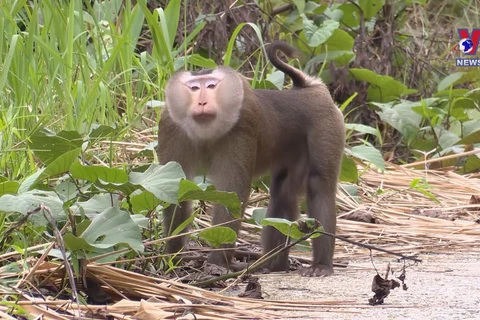Thua Thien -Hue (VNA) – The People’s Committee of the central province of Thua Thien-Hue organised a ceremony on June 17 evening at Ngọ Mon Square in Hue city to celebrate the UNESCO recognition of the Complex of Hue Monuments and nha nhac (royal court music).
The Complex of Hue Monuments was recognised as a World Cultural Heritage on December 11, 1993, and the royal court music won the recognition on November 7, 2003.
Prominent among the guests were Politburo member, President of the Ho Chi Minh National Academy of Politics and Chairman of the Central Theory Council Nguyen Xuan Thang, Deputy Prime Minister Tran Luu Quang, and representatives of UNESCO and other international organisations in Vietnam.
In his remarks, Thang noted that the recognition has paved way for Vietnamese cultural heritages to gradually integrate into the region and the world.
The Complex of Hue Monuments was recognised as a World Cultural Heritage on December 11, 1993, and the royal court music won the recognition on November 7, 2003.
Prominent among the guests were Politburo member, President of the Ho Chi Minh National Academy of Politics and Chairman of the Central Theory Council Nguyen Xuan Thang, Deputy Prime Minister Tran Luu Quang, and representatives of UNESCO and other international organisations in Vietnam.
In his remarks, Thang noted that the recognition has paved way for Vietnamese cultural heritages to gradually integrate into the region and the world.
The Hue culture is special, he said, stressing that Thua Thien-Hue is the only province in Vietnam and Southeast Asia to be home to five UNESCO-recognised cultural heritages. They are the Complex of Hue Monuments (1993-tangible heritage), nha nhac (2003-intangible heritage), woodblocks of Nguyen Dynasty (2009-documentary heritage), documents of Nguyen Dynasty (2014-documentary heritage), and royal literature on Hue Royal Architecture (2016-documentary heritage).
Such cultural heritages have served as a great impulse for the local socio-economic development, as well as a special cultural diplomatic channel, helping promote the friendship and mutual understanding between Vietnam and international friends, Thang said.
The official asked Thua Thien-Hue to continue raising public awareness of the role and position of culture, and preserving and upholding heritage values in the ancient capital city of Hue.
Hue has been hailed by UNESCO as the leading Vietnamese locality in terms of heritage preservation, which turned it into a model centre for technological heritage transfer in the Asia-Pacific region, according to the municipal Department of Culture and Sports.
Over the past few years, around 170 works of different sizes have been restored – most notably Ngo Mon, Thai Hoa Palace, Hien Lam Cac and Duyet Thi Duong as well as the royal tombs of Kings Gia Long, Dong Khanh, Thieu Tri, and Tu Duc, among others.
The complex was recognised as World Heritage by UNESCO in 1993. It is the 410th heritage inscribed onto UNESCO's list and the first world cultural heritage in Vietnam.
Nha nhac refers to a broad range of musical and dance styles performed at the Vietnamese royal court from the fifteenth to the mid-twentieth century. It was generally featured at the opening and closing of ceremonies associated with anniversaries, religious holidays, coronations, funerals and official receptions.
Nha nhac refers to a broad range of musical and dance styles performed at the Vietnamese royal court from the fifteenth to the mid-twentieth century. It was generally featured at the opening and closing of ceremonies associated with anniversaries, religious holidays, coronations, funerals and official receptions.
 Nha nhac refers to a broad range of musical and dance styles performed at the Vietnamese royal court. (Photo: VNA)
Nha nhac refers to a broad range of musical and dance styles performed at the Vietnamese royal court. (Photo: VNA) “Vietnam royal court music has the meaning of ‘refined music’. Among various kinds of music developed in Vietnam, only nha nhac is considered the national music”, according to the UNESCO Council’s evaluation./.
VNA
























